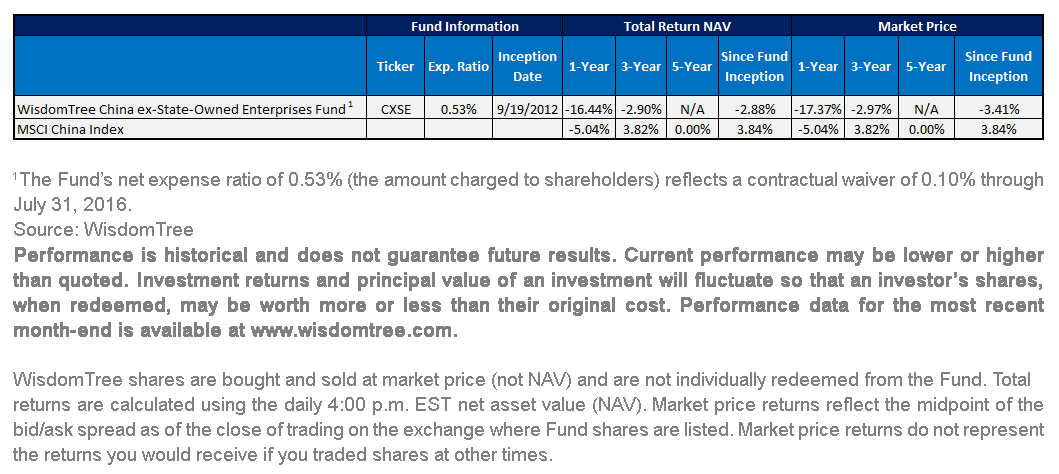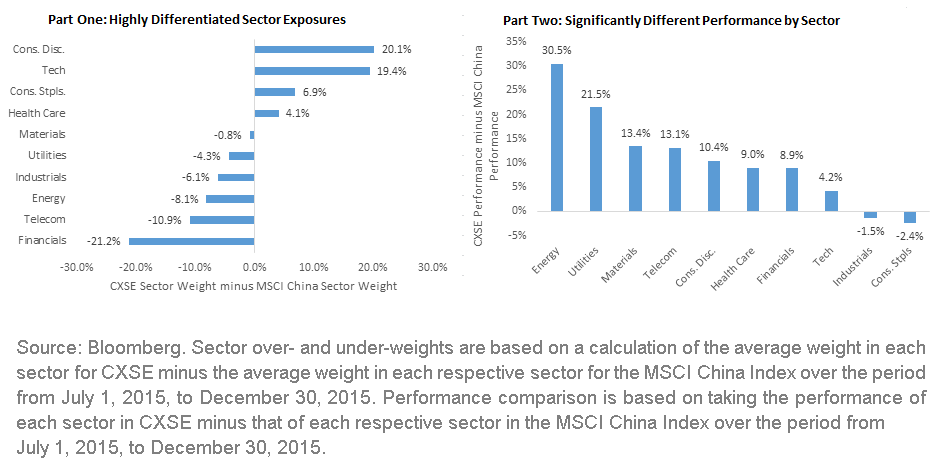A Different Approach to China’s Equity Markets



 • Differentiated Sector Exposures: CXSE has exhibited very different sector exposures than the MSCI China Index. Two approx.. 20% over-weights are in Consumer Discretionary and Information Technology. Financials, on the other hand, was a more than 21% under-weight. It’s also notable that Telecommunication Services, Energy, Utilities and Materials are sectors with under-weights within CXSE compared to the MSCI China Index.
• Significantly Different Sector Performance: To be fair, any sector performance advantage over this particular period is about being “less negative,” as opposed to finding stocks that are performing extremely well. The outperformance seen within CXSE’s Energy, Utilities, Materials and Telecommunication Services sectors over the same respective sectors within the MSCI China Index is basically about avoiding the big drawdowns that those sectors have seen recently.
Building Awareness of a New Way to Think About China’s Equity Markets
Every ETF—including CXSE—represents a tool that provides access to a particular market. We believe that looking at China through the lens of firms that are not state-owned is something new that no other ETFs are doing. If the differentiated performance persists, it could be a very interesting new "smart beta" factor exposure that could apply beyond China to other major emerging markets.
1Source: Mark Magnier, “China Economic Growth Falls Below 7% for First Time Since 2009,” The Wall Street Journal, 10/18/15.
2Source: Bloomberg, for period 12/31/14 to 12/30/15.
3Source: Neil Irwin, “Why Did China Devalue its Currency? Two Big Reasons,” The New York Times, 8/11/15.
4Source: “IMF’s Executive Board Completes Review of SDR Basket, Includes Chinese Renminbi,” International Monetary Fund Press Release, 11/30/15.
5Source: Bloomberg, with data as of 12/30/15.
6Source: International Monetary Fund World Economic Outlook Database, October 2015 data update.
7Source for bullet points: Bloomberg.
• Differentiated Sector Exposures: CXSE has exhibited very different sector exposures than the MSCI China Index. Two approx.. 20% over-weights are in Consumer Discretionary and Information Technology. Financials, on the other hand, was a more than 21% under-weight. It’s also notable that Telecommunication Services, Energy, Utilities and Materials are sectors with under-weights within CXSE compared to the MSCI China Index.
• Significantly Different Sector Performance: To be fair, any sector performance advantage over this particular period is about being “less negative,” as opposed to finding stocks that are performing extremely well. The outperformance seen within CXSE’s Energy, Utilities, Materials and Telecommunication Services sectors over the same respective sectors within the MSCI China Index is basically about avoiding the big drawdowns that those sectors have seen recently.
Building Awareness of a New Way to Think About China’s Equity Markets
Every ETF—including CXSE—represents a tool that provides access to a particular market. We believe that looking at China through the lens of firms that are not state-owned is something new that no other ETFs are doing. If the differentiated performance persists, it could be a very interesting new "smart beta" factor exposure that could apply beyond China to other major emerging markets.
1Source: Mark Magnier, “China Economic Growth Falls Below 7% for First Time Since 2009,” The Wall Street Journal, 10/18/15.
2Source: Bloomberg, for period 12/31/14 to 12/30/15.
3Source: Neil Irwin, “Why Did China Devalue its Currency? Two Big Reasons,” The New York Times, 8/11/15.
4Source: “IMF’s Executive Board Completes Review of SDR Basket, Includes Chinese Renminbi,” International Monetary Fund Press Release, 11/30/15.
5Source: Bloomberg, with data as of 12/30/15.
6Source: International Monetary Fund World Economic Outlook Database, October 2015 data update.
7Source for bullet points: Bloomberg.
Important Risks Related to this Article
There are risks associated with investing, including possible loss of principal. Foreign investing involves special risks, such as risk of loss from currency fluctuation or political or economic uncertainty. The Fund focuses its investments in China, thereby increasing the impact of events and developments associated with the region, which can adversely affect performance. Investments in emerging or offshore markets are generally less liquid and less efficient than investments in developed markets and are subject to additional risks, such as risk of adverse governmental regulation and intervention or political developments. The Fund’s exposure to certain sectors may increase its vulnerability to any single economic or regulatory development related to such sectors.
As this Fund can have a high concentration in some issuers, the Fund can be adversely impacted by changes affecting those issuers. Please read the Fund’s prospectus for specific details regarding the Fund’s risk profile.
The Global Industry Classification Standard (“GICS”) was developed by and is the exclusive property and a service mark of MSCI Inc. (“MSCI”) and Standard & Poor’s (“S&P”), a division of The McGraw-Hill Companies, Inc., and is licensed for use by WisdomTree Investments, Inc. Neither MSCI, S&P nor any other party involved in making or compiling the GICS or any GICS classifications makes any express or implied warranties or representations with respect to such standard or classification (or the results to be obtained by the use thereof), and all such parties hereby expressly disclaim all warranties of originality, accuracy, completeness, merchantability and fitness for a particular purpose with respect to any such standard or classification. Without limiting any of the foregoing, in no event shall MSCI, S&P, any of their affiliates or any third party involved in making or compiling the GICS or any GICS classifications have any liability for any direct, indirect, special, punitive, consequential or any other damages (including lost profits), even if notified of the possibility of such damages.

Christopher Gannatti began at WisdomTree as a Research Analyst in December 2010, working directly with Jeremy Schwartz, CFA®, Director of Research. In January of 2014, he was promoted to Associate Director of Research where he was responsible to lead different groups of analysts and strategists within the broader Research team at WisdomTree. In February of 2018, Christopher was promoted to Head of Research, Europe, where he was based out of WisdomTree’s London office and was responsible for the full WisdomTree research effort within the European market, as well as supporting the UCITs platform globally. In November 2021, Christopher was promoted to Global Head of Research, now responsible for numerous communications on investment strategy globally, particularly in the thematic equity space. Christopher came to WisdomTree from Lord Abbett, where he worked for four and a half years as a Regional Consultant. He received his MBA in Quantitative Finance, Accounting, and Economics from NYU’s Stern School of Business in 2010, and he received his bachelor’s degree from Colgate University in Economics in 2006. Christopher is a holder of the Chartered Financial Analyst Designation.

